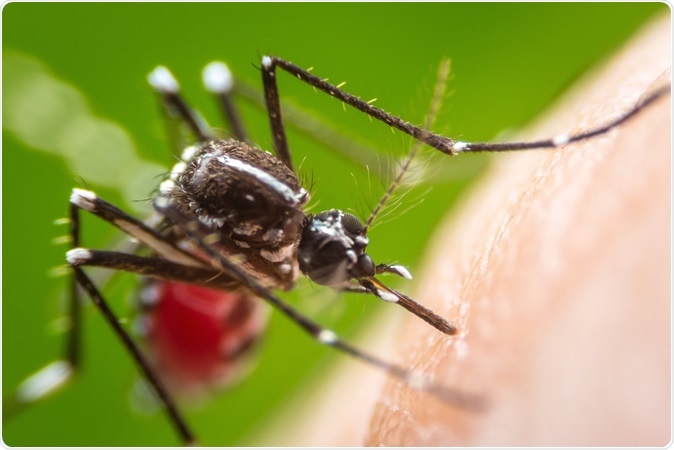Genetically modified mosquitoes
Researchers at the Imperial College’s South Kensington campus have successfully created genetically modified mosquitoes that would stop them from multiplying and spreading dreaded diseases such as malaria, Dengue, Chikungunya and Zika that kill millions worldwide annually.

Aedes aegypti mosquito on human skin. Image Credit: Khlungcenter / Shutterstock
The team is working on a project called the Gene drive. These genetically mosquitoes are rendered incapable of reproducing. Austin Burt, professor of evolutionary genetics at Imperial heads a project called Target Malaria that includes 130 scientists from 14 different institutions in Europe, Africa and North America. He explained that this could one way to stop the pests from infecting people. Andrea Crisanti, professor of molecular parasitology at Imperial added that their work has made “tremendous progress” over the past decade and a half.
Genetic modifications have not however been without protests from environmental and other civil-society organisations that have seen this as meddling into nature’s ways. They have expressed concerns regarding this technology being used to create deadly bioweapons.
Special bed nets to combat mosquitoes
Researchers collaborating from Durham University, Liverpool’s School of Tropical Medicine, Burkina Faso’s Centre National de Recherche et de Formation sur le Paludisme, and the Swiss Tropical and Public Health Institute, have tested specially made Olyset Duo bed nets comtaining pyriproxyfen and permethrin to prevent mosquitoes from biting in Sub Saharan Africa with success.
The study titled, “Efficacy of, a Olyset Duo bednet containing pyriproxyfen and permethrin, versus a permethrin-only net against clinical malaria in an area with highly pyrethroid-resistant vectors in rural Burkina Faso: a cluster-randomised controlled trial” was published in the latest issue of The Lancet.
The team wrote that these permethrin long-lasting insecticidal nets (LLINs) have been successful in the past but mosquitoes have developed a resistance to pyrethroid or permethrin. In the areas such as Burkina Faso there is intense transmission of malaria they write. Here mosquitoes are found to be most pyrethroid-resistant. They compared the permethrin only nets with permethrin and pyriproxyfen containing nets (PPF nets). The latter is an insect growth regulator. They tested these against malaria in children less than 5 years in 40 rural clusters Banfora in Burkina Faso. For each of the clusters they included 50 children aged between 6 months to 5 years. They surveyed the population at the beginning and end of the transmission seasons in 2014 and 2015. Vector or mosquito densities were measured from the indoor light traps that the team had set up.
Over the study period 1980 children were enrolled in 2014 and 2157 children were enrolled in 2015. By the end of the study over 99 percent of the children were sleeping within the bed nets. While those in the permethrin only LLIN net group showed incidence of clinical malaria at 2·0 episodes per child-year, those in the PPF net group showed 1·5 episodes per child-year. There was a 12 percent decline in malaria rates with the new nets. The researchers calculated the entomological inoculation rates and found them to be 85 and 42 infective bites per transmission season respectively in the LLIN and the PPF groups.
Dr Alfred B Tiono, head of the public health department at the Centre National de Recherche et de Formation sur le Paludisme in Burkina Faso called this an “invaluable tool” saying it would help them “tackle more efficiently this terrible and deadly disease that affects many children” preventing “millions of cases and deaths of malaria.”
Results thus showed that a combination of the two could provide greater protection from clinical malaria and authors conclude, “PPF-treated LLINs provide greater protection against clinical malaria than do standard LLINs and could be used as an alternative to standard LLINs in areas with intense transmission of Plasmodium falciparum malaria and highly pyrethroid-resistant vectors.” The study was funded by the EU Seventh Framework Programme.